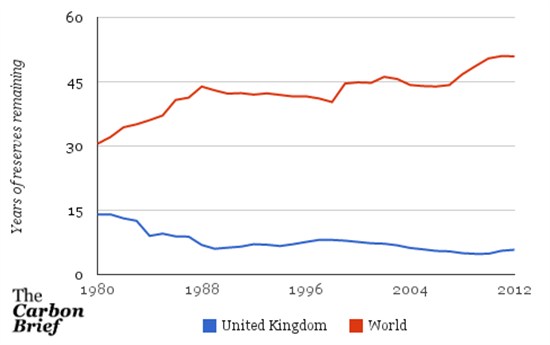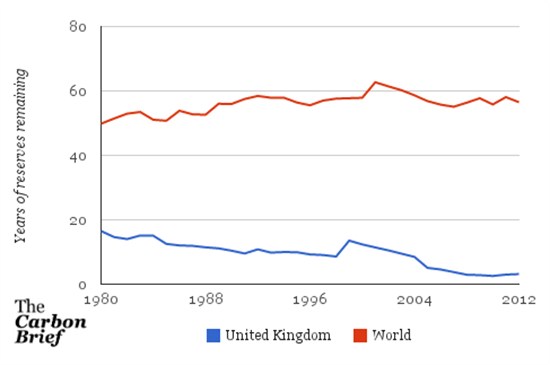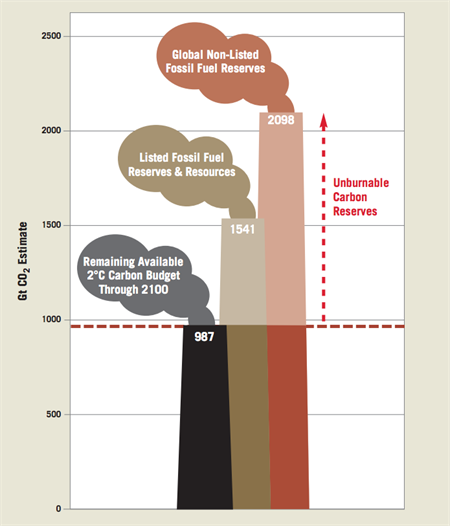Simon Evans
16.05.2014 | 3:45pmThe BBC reports that the UK will run out of oil, coal and gas in just over five years. But that isn’t true, according to an author of the study the story is based on.
The problem is that the BBC confuses reserves and resources. It’s an easy mistake to make.
Reserves versus resources
Reserves are fossil fuels that are known to be recoverable given current costs, prices, technical abilities and other constraints.
Resources are the often much larger amounts known or suspected to be available. These may or may not be recoverable, depending on advances in technology and future price fluctuations.
Here’s what the BBC says:
“In just over five years Britain will have run out of oil, coal and gas, researchers have warned. A report by the Global Sustainability Institute said shortages would increase dependency on Norway, Qatar and Russia.”
We spoke to Dr Aled Jones, director of the Global Resource Observatory that produced the research. “The BBC headline was a bit misleading”, he says.
The UK would only run out if it stopped – or was prevented from – importing any oil, gas or coal, and if it somehow became too expensive to exploit the UK’s remaining reserves.
Dr Jones says:
“The bottom line is we’re not about to run out, but there is a global political question here. We’re reliant on imports from countries that are occasionally unstable. Our report tried to understand the links between prices, political risk and the location of reserves.”
So how much oil and gas does the UK have?
The North Sea boom years are behind us, but the UK’s wells have not yet run completely dry.
We compared data on reserves and consumption to calculate how long it would take to use up current reserves.
It turns out that the UK has been ‘running out’ of oil for decades. In fact, the UK has had much less than 15 years of oil reserves remaining for the past 30 years (blue line).
But at a global level reserves have grown – faster than rising consumption (red line).

Source: Carbon Brief analysis using data from BP’s 2013 Statistical Review of World Energy
The point is that oil firms continually explore resources to find more reserves. Higher oil prices turn previously uneconomic resources into reserves too.
A similar story emerges for gas. Global reserves are higher than in 1980 (red line). And at current rates of consumption the UK would use up its reserves in less than three years (blue line):

Source: Carbon Brief analysis using data from BP’s 2013 Statistical Review of World Energy
But the UK had less than three years’ worth of reserves three years ago too, and we haven’t run out yet. Again, further reserves have been opened up through exploration or changing prices.
How much of our fossil fuel reserves can we burn if we want to avoid dangerous climate change?
The UK – still less the world – is not about to run out of fossil fuels. That doesn’t mean we should keep burning them until we do, however.
Available reserves are so plentiful that only a fraction can be used if we want to avoid dangerous climate change of more than 2 degrees.
To meet this aim the world is supposed to avoid burning the trillionth tonne of carbon. – that’s a thousand billion tonnes. So far we have burned around half that.
There are already more than enough fossil fuel reserves listed on stock markets around the world to break that trillion tonne budget, according to thinktank Carbon Tracker. If you include proven but not listed reserves the excess is even bigger:

Source: Carbon Tracker Initiative
And if you start counting not just the reserves known to be recoverable today but the resources thought to be buried underground, the excess becomes huge. The global coal resource is well over 20 trillion tonnes, figures from the International Energy Agency show.
So the BBC had the story half right. There are tough questions to answer around the UK’s dependence on fossil energy. Not because we’re going to run out, but because the UK – and the world – has far too much.

